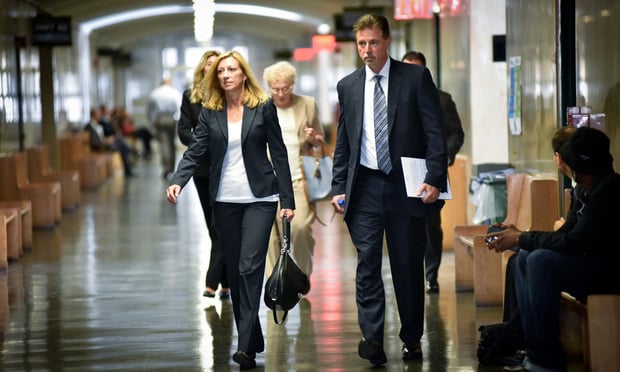 Joel Sanders and family members head into court for his sentencing. (Photo: David Handschuh/ALM)
Joel Sanders and family members head into court for his sentencing. (Photo: David Handschuh/ALM)Ex-Dewey CFO, Criticizing Prosecutors and Former Defense Lawyers, Seeks Reversal
Joel Sanders is pushing for his million-dollar fine to be vacated and for the case against him to be completely thrown out.
August 09, 2019 at 03:25 PM
4 minute read
The original version of this story was published on New York Law Journal
Former Dewey & LeBoeuf executive Joel Sanders is battling to have his criminal conviction overturned, filing a 180-page appellate brief arguing that prosecutors, his former defense lawyer and the trial judge all violated his rights to a fair trial and due process.
Sanders, the former chief financial officer at Dewey, was convicted, after a second trial, of conspiracy, scheme to defraud and securities fraud under the Martin Act. Sanders, who works at Greenspoon Marder, was sentenced in 2017 to a $1 million fine and 750 hours of community service with the threat of jail if he didn’t comply.
In Sanders’ Aug. 5 appellate brief, filed by his lawyers at DLA Piper, he assailed the witness testimony against him as unreliable. He went especially hard on testimony by Francis Canellas, the firm’s ex-director of finance, who took a plea deal and implicated Sanders in criminal acts, but wrote in an email to a former colleague after the trial that “there was never any criminal intent” and “no one was thinking they were breaking the law,” which Sanders deemed a recantation.
“The recantation directly contradicts Canellas’ testimony,” the appeal brief claims, “and leaves no doubt that he never believed either he or Sanders committed any crimes.”
Sanders was tried alongside Stephen DiCarmine, Dewey’s former executive director, who was acquitted. Sanders, in his appeal brief, assailed his former lawyers for not pushing for him to be tried separately from DiCarmine. He said it became clear at the first trial that DiCarmine was trying to shift blame to him.
“Sanders’ counsel provided ineffective assistance of counsel by failing to request that Sanders’ [second trial] be severed from DiCarmine’s,” he argued, “in order to ensure Sanders could receive a fair trial.”
Andrew Frisch, who represented Sanders during the first and second trial, didn’t immediately respond to a comment request on Friday.
Sanders also asked the Appellate Division, First Department, to reverse his conviction because prosecutors allegedly introduced evidence of conduct he had been acquitted of to secure his conviction. “Trial 2 was replete with erroneous trial court rulings and prosecutorial misconduct that virtually guaranteed Sanders’ conviction and denied him a fair trial in violation of his state and federal constitutional rights,” he argued.
The brief further attacked evidentiary decisions, the guilty verdict and Justice Robert Stolz’s refusal to throw it out. He said the court deprived him of his constitutional rights by allowing a second trial to proceed after he was cleared on key counts at the first one, by letting the jury hear misleading evidence, such as an email where he referred to “cook[ing] the books,” and by not throwing the conviction out after the Martin Act’s scope was limited in an appellate decision.
Sanders’ sentence of no jail time shocked observers, but he was briefly locked up a year later, with the court saying he failed to pay the fine despite having the resources to do so. Greenspoon Marder, where Sanders has worked as chief operating officer, paid the fine and got him released, his lawyer told Law.com.
It wasn’t immediately clear when the Manhattan District Attorney’s office would file its own brief in response. A spokesman for the office declined to comment.
Sanders is represented on appeal by Christopher Oprison and Jessica Masella of DLA Piper.
This content has been archived. It is available through our partners, LexisNexis® and Bloomberg Law.
To view this content, please continue to their sites.
Not a Lexis Subscriber?
Subscribe Now
Not a Bloomberg Law Subscriber?
Subscribe Now
NOT FOR REPRINT
© 2024 ALM Global, LLC, All Rights Reserved. Request academic re-use from www.copyright.com. All other uses, submit a request to [email protected]. For more information visit Asset & Logo Licensing.
You Might Like
View All
'Everyone Was in the Dark': For Stroock Staff, No Communication, No Jobs
7 minute read
'A Lot of Hand Wringing': Stroock Leaders Act on Backup Plans to Failed Merger Talks
Trending Stories
- 1Infant Formula Judge Sanctions Kirkland's Jim Hurst: 'Overtly Crossed the Lines'
- 2Trump's Return to the White House: The Legal Industry Reacts
- 3Election 2024: Nationwide Judicial Races and Ballot Measures to Watch
- 4Climate Disputes, International Arbitration, and State Court Limitations for Global Issues
- 5Judicial Face-Off: Navigating the Ethical and Efficient Use of AI in Legal Practice [CLE Pending]
- 6How Much Does the Frequency of Retirement Withdrawals Matter?
Who Got The Work
Michael G. Bongiorno, Andrew Scott Dulberg and Elizabeth E. Driscoll from Wilmer Cutler Pickering Hale and Dorr have stepped in to represent Symbotic Inc., an A.I.-enabled technology platform that focuses on increasing supply chain efficiency, and other defendants in a pending shareholder derivative lawsuit. The case, filed Oct. 2 in Massachusetts District Court by the Brown Law Firm on behalf of Stephen Austen, accuses certain officers and directors of misleading investors in regard to Symbotic's potential for margin growth by failing to disclose that the company was not equipped to timely deploy its systems or manage expenses through project delays. The case, assigned to U.S. District Judge Nathaniel M. Gorton, is 1:24-cv-12522, Austen v. Cohen et al.
Who Got The Work
Edmund Polubinski and Marie Killmond of Davis Polk & Wardwell have entered appearances for data platform software development company MongoDB and other defendants in a pending shareholder derivative lawsuit. The action, filed Oct. 7 in New York Southern District Court by the Brown Law Firm, accuses the company's directors and/or officers of falsely expressing confidence in the company’s restructuring of its sales incentive plan and downplaying the severity of decreases in its upfront commitments. The case is 1:24-cv-07594, Roy v. Ittycheria et al.
Who Got The Work
Amy O. Bruchs and Kurt F. Ellison of Michael Best & Friedrich have entered appearances for Epic Systems Corp. in a pending employment discrimination lawsuit. The suit was filed Sept. 7 in Wisconsin Western District Court by Levine Eisberner LLC and Siri & Glimstad on behalf of a project manager who claims that he was wrongfully terminated after applying for a religious exemption to the defendant's COVID-19 vaccine mandate. The case, assigned to U.S. Magistrate Judge Anita Marie Boor, is 3:24-cv-00630, Secker, Nathan v. Epic Systems Corporation.
Who Got The Work
David X. Sullivan, Thomas J. Finn and Gregory A. Hall from McCarter & English have entered appearances for Sunrun Installation Services in a pending civil rights lawsuit. The complaint was filed Sept. 4 in Connecticut District Court by attorney Robert M. Berke on behalf of former employee George Edward Steins, who was arrested and charged with employing an unregistered home improvement salesperson. The complaint alleges that had Sunrun informed the Connecticut Department of Consumer Protection that the plaintiff's employment had ended in 2017 and that he no longer held Sunrun's home improvement contractor license, he would not have been hit with charges, which were dismissed in May 2024. The case, assigned to U.S. District Judge Jeffrey A. Meyer, is 3:24-cv-01423, Steins v. Sunrun, Inc. et al.
Who Got The Work
Greenberg Traurig shareholder Joshua L. Raskin has entered an appearance for boohoo.com UK Ltd. in a pending patent infringement lawsuit. The suit, filed Sept. 3 in Texas Eastern District Court by Rozier Hardt McDonough on behalf of Alto Dynamics, asserts five patents related to an online shopping platform. The case, assigned to U.S. District Judge Rodney Gilstrap, is 2:24-cv-00719, Alto Dynamics, LLC v. boohoo.com UK Limited.
Featured Firms
Law Offices of Gary Martin Hays & Associates, P.C.
(470) 294-1674
Law Offices of Mark E. Salomone
(857) 444-6468
Smith & Hassler
(713) 739-1250









